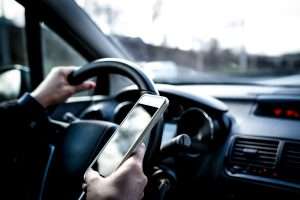RECENT POSTS
Categories
Arguments Against Texting and Driving: is it worth it?
You’ve heard it a thousand times—don’t text and drive. You’ve seen it on billboards and in commercials every day, but the reality is that it’s still one of the most fatal issues we’re dealing with today. While texting is a huge part of this, all distracted driving causes serious accidents.
Distracted driving is categorized as any activity that diverts the driver’s attention away from operating their vehicle. That’s a pretty wide umbrella—looking at your GPS, changing the radio station, talking to passengers, and of course texting are all considered distracted driving.
TEXTING AND DRIVING STATISTICS
Cell phones are the leading cause of distracted driving accidents and car accident injuries in Alabama. A typical AL driver has a one-in-three chance of getting into a car crash involving injury or death without texting—a texting driver is 23 times more likely to get into a car crash.
The National Highway Traffic Safety Administration reports that some 660,000 drivers nationwide are using their cell phones at any given time during daylight hours. According to the National Safety Council (NSC), however, there’s a serious problem of under-reporting cell phone use in auto accidents. Because of this, and because there isn’t a reliable method for determining how many distracted driving accidents involve cell phones, the problem is even more serious than it seems on paper.
HOW MANY PEOPLE DIE FROM TEXTING AND DRIVING?
The 2016 crash fatality rate for Alabama was actually higher than the national crash fatality rate in 2016—this is more than a nationwide problem, it’s a local and state problem. To make matters worse, the NSC says that hands-free technology is not necessarily safer, so just mounting your phone to the dash does not solve the problem. On the contrary, hands-free technology can give drivers a false sense of security. They feel like they’re being safer, but they’re just as distracted, and less likely to be careful because they feel safer.
The reality is, distracted driving is just that—driving while distracted, which puts you and anyone else in the car with you or on the road at risk. The part of the brain that processes moving images decreases by up to one-third when talking on a phone, and that’s just talking. Drivers looking out of their windshields while talking on the phone can miss seeing up to 50% of what’s around them—it’s not just glancing at your phone that’s the risk, it’s being distracted in any way.
The fact is, distracted driving is a huge problem in our state and in our country, and texting is just part of it. Keeping your eyes on the road isn’t enough—distracting your mind while doing something as important as driving is a danger to you and everyone around you. It’s just not worth it.
THE PSYCHOLOGICAL IMPACT OF DISTRACTED DRIVING
Driving requires full attention and quick decision-making. When you are distracted, your reaction time slows, and your ability to make quick decisions is impaired. This can lead to increased stress and anxiety, both during and after driving. Constant distractions can also lead to a lack of focus in other areas of life, as the habit of dividing attention becomes ingrained.
THE ECONOMIC COSTS OF DISTRACTED DRIVING
Distracted driving doesn’t only have a human cost but an economic one as well. Accidents caused by distracted driving result in significant financial burdens, including medical bills, property damage, and lost wages. Insurance premiums can also skyrocket following an accident, adding to the financial strain.
THE ROLE OF LEGISLATION IN COMBATING DISTRACTED DRIVING
Many states, including Alabama, have enacted laws to combat distracted driving. These laws range from bans on texting while driving to prohibitions on all handheld device use. However, enforcement remains a challenge. Increased penalties and public awareness campaigns are essential to reducing distracted driving incidents.
THE BENEFITS OF NOT TEXTING AND DRIVING
Improved Safety
The most immediate benefit of not texting and driving is improved safety for yourself and others on the road. By focusing on driving, you significantly reduce the risk of accidents and fatalities.
Better Driving Record
Avoiding distracted driving helps maintain a clean driving record, which can lead to lower insurance premiums and fewer fines. A good driving record is also beneficial for personal and professional reasons.
Enhanced Focus and Mental Health
By not texting and driving, you can maintain better focus and reduce stress levels. This improved attention can have positive effects on your overall mental health, reducing anxiety related to driving.
Positive Influence
By committing to not text and drive, you set a positive example for others, especially younger drivers. Your actions can inspire friends, family, and community members to adopt safer driving habits.
CONTACT WETTERMARK KEITH
If you want more information or if you’ve been involved in a car accident, contact the car accident lawyers from Wettermark Keith today. Our experienced team can provide you with the support and representation you need to navigate the aftermath of a distracted driving accident.
Distracted driving is considered to be as dangerous as drunk driving. In fact, the National Highway Traffic Safety Administration reports that distracted driving is a leading cause of car accidents and injuries in the U.S. and that it increases the risk of a crash by 23 times.
Ready to work together? Contact us today for a free consultation.
HERE'S WHAT TO DO NEXT
If you or a loved one have been injured and think you might have a case, call us now for a free consultation.



